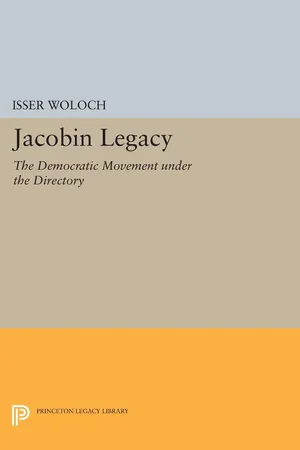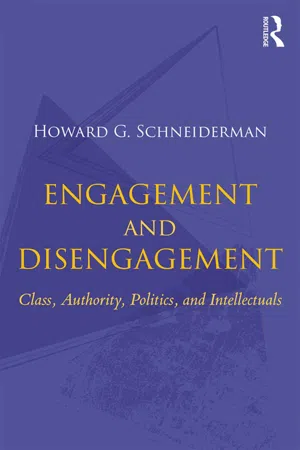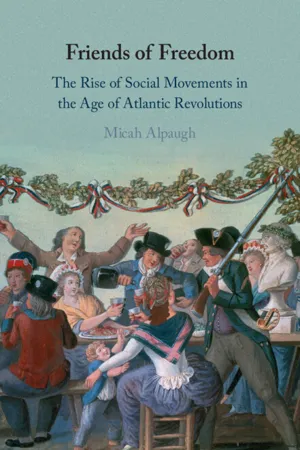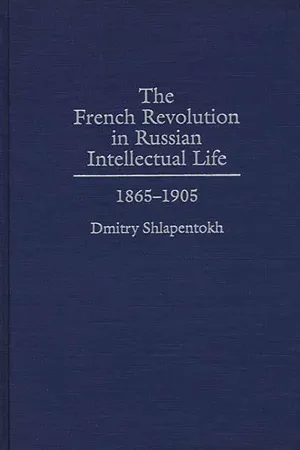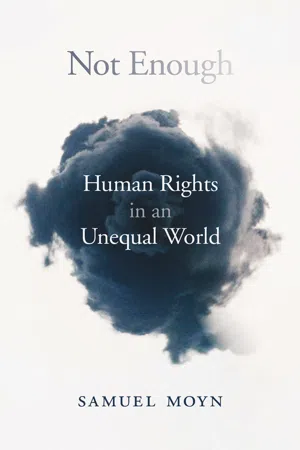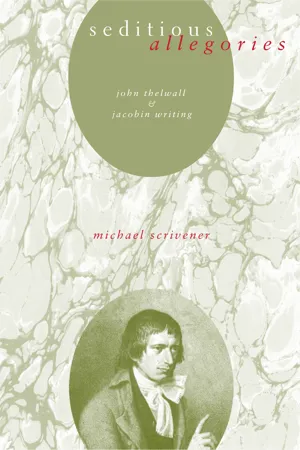History
Jacobins
The Jacobins were a radical political club during the French Revolution, known for their role in the Reign of Terror. They advocated for the overthrow of the monarchy and the establishment of a republic, and were associated with extreme measures to suppress opposition. The Jacobins played a significant role in shaping the course of the Revolution and the subsequent political landscape of France.
Written by Perlego with AI-assistance
Related key terms
1 of 5
8 Key excerpts on "Jacobins"
- eBook - PDF
Jacobin Legacy
The Democratic Movement under the Directory
- Isser Woloch(Author)
- 2015(Publication Date)
- Princeton University Press(Publisher)
At the same time, however, the Jacobin clubs continued to be formidable action groups in their own communities. Local issues fill the annals of each club. More than anything else the clubs rendered political life tan- gible and meaningful to the politically conscious, pro-revolutionary citizen. Along with the national guard, the clubs were the crucial institution through which people participated directly in the Revo- lution and influenced the course of events locally. Even after they were "bureaucratized" by the revolutionary government, in their towns and villages they continued to articulate local concerns. 15 In a way that should have startled Tocqueville, they invaded the insulated world of officialdom. Though the ultimate allegiance of the clubs to the Convention was never in doubt after the summer of 1793, individual clubs often fought bitterly with particular rep- resentatives-on-mission from the Convention. In one way or an- other the Jacobins exemplified the notion of self-help in a period when the inherited framework of monarchical authority lay in ruins. The most fundamental trait of Jacobinism was its cultiva- tion of civisme and "public spirit." Citizenship (for the patriotic minority) and the corresponding notion of a responsive govern- ment remained their norm. In this important sense the Jacobins were democrats. 16 15 Cobb, Les Armees revolutionnaires, Vol. 11, Ch. 2, explains the "commu- nalist mentality" in regard to subsistence questions. le The theoretical definition of democracy offered by the political scientist Pierre Duclos seems an apt description of Jacobinism's democratic thrust. Democracy, he writes, is not to be equated simply with universal suffrage and The Jacobin Clubs, 1792-95 Another aspect of Jacobinism that promised to endure beyond the emergency of the revolutionary crisis was its qualified brand of social egalitarianism. In this respect the clubs completely out- grew their origins in the constitutional monarchy period. - eBook - PDF
Engagement and Disengagement
Class, Authority, Politics, and Intellectuals
- Howard G. Schneiderman(Author)
- 2017(Publication Date)
- Routledge(Publisher)
This is a key point, because as a party the Jacobins vied for power in the government, but they were not the governing body itself. 74 POLITICAL CLUBS, PARTIES, AND RADICALISM Before Brinton’s time sociologists as varied as Herbert Spencer, Lester Ward, John Commons, Moise Ostrogorski, James Bryce, Max Weber, and Robert Michels had published analyses of parties that are still relevant today. Brinton, who modeled his work so as to be able to call it retrospec-tive sociology, was aware of at least significant parts of this literature, and he was well aware that parties take many shapes, one of which was represented by the Jacobins. Through political organization, propaganda, and violence, the Jacobins promoted paranoid visions of enemies within France, and were by and large responsible for bringing on the Reign of Terror soon after the Revolution had begun. These extremist visions led to the public execu-tions of King Louis XVI, Queen Marie Antoinette, and many thousands more during the thirteen months of the Terror, which lasted from June 1793 through July 1794. At its end, the Terror turned upon its own leaders, including St. Just and Maximillian de Robespierre, who were themselves executed by their infamous guillotine that had beheaded thousands, per-haps tens of thousands of “enemies of the Revolution.” Robespierre was surely the most famous Jacobin, but he isn’t mentioned by Brinton until the middle of the second chapter of The Jacobins , and then only in passing. For many old-school historians and biographers, it would have been inconceivable to understand the political force and importance of the Jacobin clubs to the French Revolution without placing Robespierre at the head of the line. Thus, John Morley’s Robespierre , published in 1886, Jules Michelet’s 1899 biography, Robespierre , and Hilaire Belloc’s Robespi-erre: A Study , published in 1901, are representative pre-New History works concentrating on the Jacobins through their most famous representative. - S. Andrews(Author)
- 2000(Publication Date)
- Palgrave Macmillan(Publisher)
213 Figure 16.1 Thomas Rowlandson, A Charm for a Democracy, Reviewed, Analysed & Destroyed Of the 400 000, Burke reckons that one-fifth are ‘pure Jacobins; utterly and incapable of amendment’ – hence his opponents’ references to ‘80,000 Jacobins’. 48 In 1796 a Jacobin was (for Burke) anyone who opposed the war with France, which he argued they saw as an obstacle to their political programme. Writing in that year, Thelwall accepted the label ‘Jacobin’ because ‘it is fixed upon us, as a stigma, by our enemies’. 49 Thelwall stood for those who disagreed with Burke, whom he called the ‘grey-headed procurator of proscription and blood’. Thelwall called for freedom of expression so that ‘the opinions, not of a tenth part, but of the whole nation can be freely delivered and distinctly heard’. He wanted equal rights for all, ‘not in equality of distribution; but in equal opportunities of benefiting from the things distributed’. The only crime of the ‘Jacobin’ is that ‘he looks forward to a state of society more extensive in its refinements than any which has yet been known’. 50 By October 1798, when the Anti-Jacobin Review was newly established, the Monthly Magazine wanted to insist on a strict definition, tied more closely to its French context. Thus the essence of Jacobinism ‘according to its true signification’ was: To hold that a majority may lawfully be governed by a minority upon the pretext of the public good. To pay no regard to the will of the nation, as declared by those who have been fairly delegated for the purpose. To scruple no means, however base or violent to compass a political end. To consider absolute anarchy, and the destruction of all natural and civil rights as a cheap purchase for speculative improvements in a constitution. On the other hand, the Monthly Magazine continues, ‘it is not Jacobinism to maintain – That government was instituted for the good of the many, not the emolument of the few’.- eBook - PDF
Friends of Freedom
The Rise of Social Movements in the Age of Atlantic Revolutions
- Micah Alpaugh(Author)
- 2021(Publication Date)
- Cambridge University Press(Publisher)
As the French Revolution radicalized anew in 1792, the Jacobins possessed unmatched national strength. Political Crises and Jacobin Radicalization Jacobin ambitions outstripped any preceding Atlantic movement’s. Building from international examples, Jacobins believed they were constructing a model that could be applied anywhere. “All the earth’s peoples are watching us,” Limoges’ Jacobins declared in October 1790. “In vain will despots try to delay universal regeneration, in vain will they oppose the propagation of light” once other peoples learned. 114 As the Strasbourg club’s president predicted that summer, after acknowledging the “fraternal salutations of several societies of friends in Ireland, Scotland and England,” that “soon only tyrants and their slaves will be foreigners.” 115 The example of free association and united action, so powerful and unprecedented in France, seemed exportable. Facing so many challenges, French Jacobins envied the United States for their revolution’s seeming ease. If Americans “had armies to combat,” described a Rouen Jacobins orator in December 1790, France had “more difficult obstacles to surmount, many prejudices to destroy, a long rampart of privileges to demolish.” Whereas Americans were “raised on sentiments of independence,” the French “in a single step crossed the immense distance from slavery to liberty.” 116 No ocean separated France from tyrants. Yet on hearing of the British reformer Price’s death, Paris’s Jacobins in May 1791 declared eight days’ mourning, writing to the Revolution Society of their esteem for the American sympathizer, since “the revolution of the United States has so influenced our own.” 117 Hope remained for a new order of stability and peace, alongside an open-eyed realization of the difficulties to surmount. The Revolution would advance, proponents argued, through principle and emulation – not offensive war. - eBook - PDF
- Dmitry Shlapentokh(Author)
- 1996(Publication Date)
- Praeger(Publisher)
According to Tkachev, the Jacobinic purge was to be the coup de grace to the old society. The organized terror of the Russian Jacobins would be as pitiless as the spontaneous terror of the rampant populace. But one should not blame Jacobins for indiscrimi- nate terror, since world history was nothing more than a chain of endless violence. "To destroy the power of feudal lords, the terrorism of the king's power was required; to destroy the kingdom of Louis XVI, the terrorism of the bourgeoisie was indispensable." A peaceful transition between one social form and the next was only "one of the non-existing Utopias that humanity has always invented to quiet its conscience and to obscure it vision." 602 Tkachev's contemporaries also confirm, that he and his supporters looked upon the Jacobinic terror as a cornerstone of political doctrine. Supporters of the Tocsin [Nabat, Tkachev's vehicle] saw in the pitiless extermination of the revolution's enemies, the terror and violence as the alpha and omega of revolutionary politics. In such a case they liked to refer to Robespierre and Saint-Just and proudly called themselves "Jacobins." 603 The function of the Jacobinic dictatorship was not to be limited, according to Tkachev, to the launching of terror against the counter-revolutionaries. It should actively participate in overturning the social and economic foundations of the country. Another central function of the Russian Jacobins was to curb the violence of the populace. The idea that a strong revolutionary government was to save the country from anarchy in the case of popular revolution was deeply embedded in 136 The French Revolution in Russian Intellectual Life Russian revolutionary tradition as well as in Western political thought. - eBook - PDF
Historicizing the French Revolution
The Two Hundred Years’ War
- Antonino De Francesco(Author)
- 2022(Publication Date)
- Bloomsbury Academic(Publisher)
His reading of Jacobinism thus relied on the networks of relations and the circuits of diffusion of original political messages to suggest, against counter-revolutionary anathema, that those practices belonged entirely to the social world of the time, and even radical circles were a clear expression of this world. At the same time, his decision to emphasize the cultural profile of Jacobinism allowed him to distance himself from Mathiez’s interpretation: Brinton tended to a great extent to play down the impact of a specific economic imprint, even on the political line of extremist circles. What prevailed, on the other hand, was the portrait of a party whose originality lay in a series of radical practices intended to transform patriotism into a form of fanaticism, whose ambition to achieve social palingenesis was similar to the approach of a religious order. As a consequence, the Terror lost all economic and social foundations to become the instrument – an exceptional one, certainly – of a truly political decision, dictated 210 Historicizing the French Revolution by the certainty that, faced with the dramatic circumstances of Year II, the elimination of impure subjects – incapable, in other words, of achieving the regeneration of society – constituted an obligatory passage for the triumph of the democratic ideal. This was an influential perspective: in 1935, one of Brinton’s students, Donald Greer, published a statistical study of the victims of the Terror that led to the same conclusion, indicating that the majority of victims were not in fact aristocrats and excluding socio-economic prejudice as a motive for the repression. - eBook - PDF
Not Enough
Human Rights in an Unequal World
- Samuel Moyn(Author)
- 2018(Publication Date)
- Belknap Press(Publisher)
The Jacobin state verged toward dictatorship in emergency circumstances, Palmer allowed, as some twentieth- century states did and as his own great Democratic president Franklin Roosevelt had even been accused of doing. Poised between democracy and dictatorship themselves, the Jacobins had pioneered a state that 1 Jacobin Legacy: The Origins of Social Justice Jacobin Legacy 13 would be “interventionist, offering social services; it was to plan and guide the institutions of the country, using legislation to lift up the common man.” Already the French Revolution had not merely introduced human rights as a lingua franca of politics for modern states—it had also initiated the contentious struggle for social welfare. 2 The history of economic and social rights, which has almost never been written, depends on a framework that captures the full aspirations of the political enterprises of which those rights have been a part. It is important to track the annunciation of each of the now-canonical social rights—first, rights to education and public relief; later, rights to work and to workplace protections; and ultimately, a panoply of other entitlements. But followed one by one or even together, the emergence of such rights makes no sense. Rather, a history of these rights requires an account of the main ideolog-ical origins of the welfare state and also, therefore, an account of contending responses to what the nineteenth century dubbed “the social question.” That account, in turn, shows that reducing the origins of the welfare state and the resolution of the social question to the narrower prehistory of economic and social rights would be a serious mistake, in part because of longstanding uncertainty about whether rights were a viable language for pursuing social justice. Indeed, until the end of World War II, it remained quite unclear what kind of political regime could provide adequate minimal protections. It would have to make the modern workplace more humane. - eBook - PDF
Seditious Allegories
John Thelwall and Jacobin Writing
- Michael Scrivener(Author)
- 2001(Publication Date)
- Penn State University Press(Publisher)
6 E. P. Thompson, however, claims that Paine’s inexpensive second part of the Rights of Man (February 1792) was the main provocation, especially as the LCS and the reorganized Constitu- tional Society were distributing the essay (MWC 106–7). Regardless of what motivated the government, its repression bore down on Jacobins almost as soon as they became politically active. Encouraging and justifying the repression consistently, Burke in Letters on a Regicide Peace (1796) identifies the “political citizens” and “the British publick” as consisting of about 400,000 people, largely male, of whom about a fifth (or 80,000) he considers “to be pure Jacobins; utterly incapable of amendment; objects of eternal vigilance; and when they break out, of legal constraint.” He finds that the radical “minority is great and formidable” and that they have “force” which is “far superior to their numbers” (EB 9:224). Among this 400,000 Burke does not even consider the “tradesmen and mechanics” who comprise the popular associations, which are far beneath his angle of vision. For Burke the political nation is the cultural elite, the social strata from the uppermost levels of the middle class. Burke’s sociology seems close to the mark. Patrick Colquhoun’s Treatise on the Resources of 46 Jacobinism 46 6. Albert Goodwin, The Friends of Liberty: The English Democratic Movement in the Age of the French Revolution (Cambridge, Mass.: Harvard University Press, 1979), 207, 213. Many other historians dispute Goodwin on this point. See Gregory Claeys, Thomas Paine: Social and Political Thought (Boston: Unwin Hyman, 1989), 75. the British Empire (1814) discovered an upper class of 512,535, around 4 percent of the overall population. 7 Burke is worried about the disloyal, dan- gerous, and talented 20 percent of the elite: “Jacobinism is the revolt of the enterprising talents of a country against it’s property” (EB 9:241; Two Let- ters on a Regicide Peace 1796).
Index pages curate the most relevant extracts from our library of academic textbooks. They’ve been created using an in-house natural language model (NLM), each adding context and meaning to key research topics.
